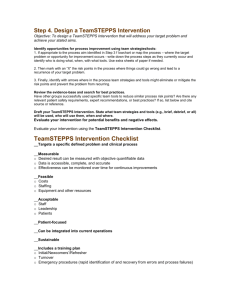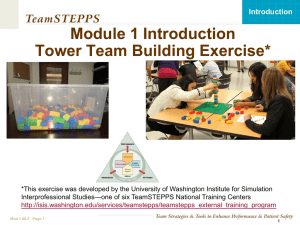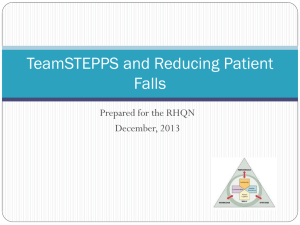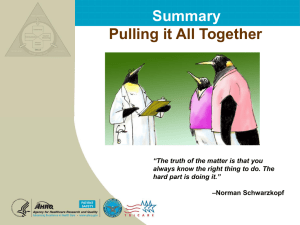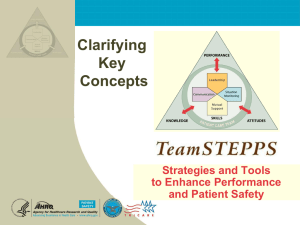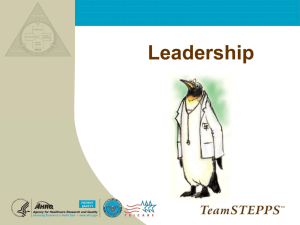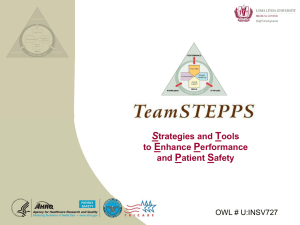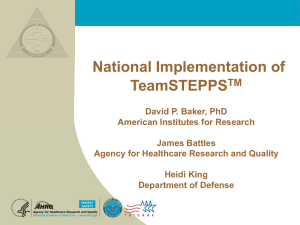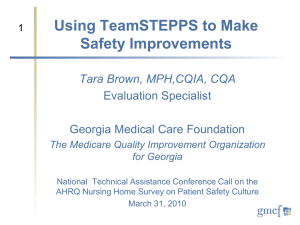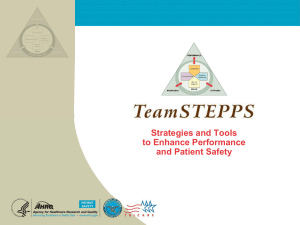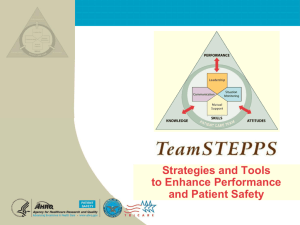TS Module 2 Slides Team Structure
advertisement
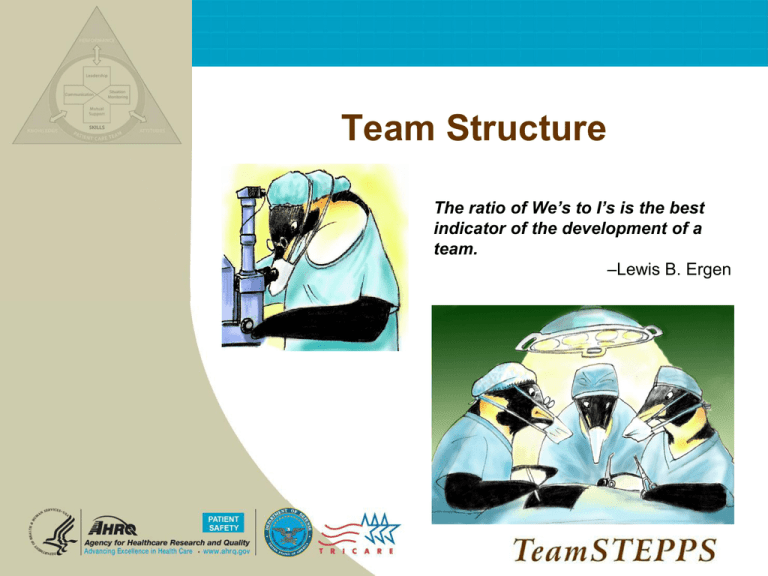
Team Structure NEXT: The ratio of We’s to I’s is the best indicator of the development of a team. –Lewis B. Ergen Team Structure Objectives • Understand what defines a team • Identify the characteristics of high-performing teams • Discuss benefits of teamwork and team structure • Describe components and composition of a multi-team system (e.g., Core Team, Coordinating Team, Contingency Team, Ancillary Services, and Administration) • Define the roles and effectiveness of team members Mod 2 06.1 Page 2 TEAMSTEPPS 05.2 2 Team Structure Team Structure Common purpose Performance Goals Mutual Accountability Clear Roles/Responsibilities Complementary Skills Interdependent Tasks Patient & Family Team Skills are the result of effective team structure Mod 2 06.1 Page 3 TEAMSTEPPS 05.2 3 Team Structure What Defines a Team? • Two or more people • Interact dynamically, interdependently, and adaptively • Toward a common and valued goal (14% of team function) • Have specific roles or functions (12% of team function) • Have a time-limited membership Salas et al. Does team training work? Principles for health care. Acad Emerg Med. 2008. 15:1-8. Mod 2 06.1 Page 4 TEAMSTEPPS 05.2 4 Team Structure Partnering with the Patient Embrace patients as valuable and contributing partners in patient care − Listen to patients − Learn patients’ preference regarding involvement − Ask patients about their concerns − Speak to them in lay terms − Ask for their feedback − Give them access to relevant information − Encourage patients and families to proactively participate in patient care (teach back) Mod 2 06.1 Page 5 TEAMSTEPPS 05.2 1. What is my main problem? 2. What do I need to do? 3. Why is it important for me to do this? http://www.npsf.org/for-healthcareprofessionals/programs/ask-me-3/ Teach – Back / Show-Me Method http://pilot.train.hrsa.gov/uhc/pdf/module _02_job_aid_teach_back_method.pdf 5 Groups vs. Teams Team Structure Team Working Group • Clearly focused leader • Share leadership roles • Individual accountability • Mutual accountability • Individual work products • • Efficient meetings • Problem-solving meetings • Indirect measures of performance • Direct measures of performance • Discusses, decides, delegates • Discusses, decides, works together Collective work products Essence of a team is common commitment Katzenbach & Smith (2005) Mod 2 06.1 Page 6 TEAMSTEPPS 05.2 6 Team Structure Barriers to Team Performance • Inconsistency in team membership • Conflict • Lack of coordination and follow-up • Lack of time • Lack of information sharing • Distractions • Hierarchy • Fatigue • Defensiveness • Workload • Conventional thinking • • Varying communication styles Misinterpretation of cues • Lack of role clarity Mod 2 06.1 Page 7 TEAMSTEPPS 05.2 7 Team Structure Team Failure Video Videos must be saved in the same file as your power point for the link to work. If the link does not work, reinsert the video: • Click on insert tab in power point • Click on Video • Click on Video from file • Click on Sue SheridanLg001 •Mod 2Click on8 Insert Vig 4aLg001.mpgTEAMSTEPPS 05.2 06.1 Page 8 Team Structure Multi-Team System (MTS) for Patient Care This structure… establishes clarity of roles and responsibilities that makes mutual accountability possible Mod 2 06.1 Page 9 TEAMSTEPPS 05.2 9 Team Structure A Core Team is… Made up of care providers who work interdependently to manage a set of assigned patients Dynamic Leadership Core Team members have the closest contact with the patient! Mod 2 06.1 Page 10 TEAMSTEPPS 05.2 10 Team Structure A Coordinating Team is… Responsible for managing the operational environment and resources that supports the Core Team Designated Leadership Mod 2 06.1 Page 11 TEAMSTEPPS 05.2 11 Team Structure A Contingency Team is… A time-limited team formed for emergent or specific events and composed of members from various teams Mod 2 06.1 Page 12 TEAMSTEPPS 05.2 12 Team Structure Ancillary & Support Services provide… Ancillary Services provide direct, task-specific, timelimited care to patients. Support Services provide indirect service-focused tasks which help to facilitate the optimal healthcare experience for patients and their families. Mod 2 06.1 Page 13 TEAMSTEPPS 05.2 13 Team Structure The Role of Administration is to… • Establish and communicate vision • Develop policies and set expectations for staff related to teamwork • Support and encourage staff during implementation and culture change • Hold teams accountable for team performance • Define the culture of the organization Mod 2 06.1 Page 14 TEAMSTEPPS 05.2 14 Team Structure Fall Risk Reduction Multi Team System Board of Directors Mod 2 06.1 Page 15 TEAMSTEPPS 05.2 15 MTS Supports Chain of Accountability Coordinating teams hold core Core teams accountable for the reliability of processes. Patient/ Family Core Team The board needs to learn about quality and safety from coordinating teams that have direct knowledge of front line structure, process, and outcome. Coordinating Team Administration Board of Directors 16 Team Structure Exercise: Your Multi-Team System ? ? Team members change but the behaviors remain the same Mod 2 06.1 Page 17 TEAMSTEPPS 05.2 17 Team Structure Paradigm Shift to Team System Approach Single focus (clinical skills) Dual focus (clinical and team skills) Individual performance Team performance Under-informed decision-making Informed decision-making Loose concept of teamwork Clear understanding of teamwork Unbalanced workload Managed workload Having information Sharing information Self-advocacy Mutual support Self-improvement Team improvement Individual efficiency Team efficiency Mod 2 06.1 Page 18 TEAMSTEPPS 05.2 18 Team Structure Effective Team Members Are better able to predict the needs of other team members Provide quality information and feedback Engage in higher level decision-making Manage conflict skillfully (NOT avoid conflict) Understand their roles and responsibilities Reduce stress on the team as a whole through better performance “Achieve a mutual goal through interdependent and adaptive actions” Mod 2 06.1 Page 19 TEAMSTEPPS 05.2 19 Team Structure Teamwork Actions • Assemble a team • Establish a leader • Identify the team’s goals and vision • Assign roles and responsibilities • Hold team members accountable • Actively share information among team members • Provide feedback “Individual commitment to a group effort—that is what makes a team work, a company work, a society work, a civilization work.” –Vince Lombardi Mod 2 06.1 Page 20 TEAMSTEPPS 05.2 20
